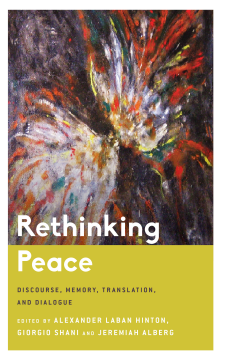
Additional Information
Book Details
Abstract
Long considered a subfield of international relations and political science, Peace Studies has solidified its place as an interdisciplinary field in its own right with a canon, degree programs, journals, conferences, and courses taught on the subject. Internationally renowned centers offering programs on Peace and Conflict Studies can be found on every continent. Almost all of the scholars working in the field, however, are united by an aspiration: attaining Peace, whether “positive” or “negative.” The telos of peace, however, itself remains undefined and elusive, notwithstanding the violence committed in its name.
This edited volume critically interrogates the field of peace studies, considering its assumptions, teleologies, canons, influence, enmeshments with power structures, biases, and normative ends. We highlight four interrelated tendencies in peace studies: hypostasis (strong essentializing tendencies), teleology (its imagined “end”), normativity (the set of often utopian and Eurocentric discourses that guide it), and enterprise (the attempt to undertake large projects, often ones of social engineering to attain this end). The chapters in this volume reveal these tendencies while offering new paths to escape them.
Visit http://www.rethinkingpeacestudies.com/ for further details on the Rethinking Peace Studies project.
Alexander Hinton is Founder and Director of the Center for the Study of Genocide and Human Rights (CGHR), Distinguished Professor of Anthropology, and UNESCO Chair on Genocide Prevention at Rutgers University.
Professor Giorgio Shani is Chair of the Department of Politics and International Studies and Director of the Rotary Peace Center at International Christian University, Tokyo, Japan.
Professor Jeremiah Alberg teaches philosophy and religion in the Humanities Department of International Christian University. He is the Director of the Library and of the Center for Teaching and Learning.
Rethinking Peace is a path-breaking book in Peace Studies. Brilliantly exposing the field’s recessive underside, it offers radically new avenues of reflection, engagement, and analysis. The volume is likely to emerge as an indispensable resource for innovative research and pedagogy.
Mustapha Kamal Pasha, Chair in International Politics, Aberystwyth University
This important volume puts into practice Ashis Nandy's admonition not simply to reject Peace Studies for its entanglements with liberal modernity, including the state, but to work to recover resources for peace from spaces and voices that are generally invisible or even exiled from our studies and practices. Though what Nandy calls "undomesticated" voices can be hard to hear from our positions in the Academy or international/transnational institutions, Rethinking Peace wisely makes issues of translation and the challenges and possibilities of dialogue central to its call for rethinking. I recommend that anyone drawn to Peace Studies first read this book as both a cautionary tale and a source of hope.
David Blaney, Professor of Political Science, Macalester College, USA
Moving beyond traditional criticisms of the liberal peace and binary approaches to critical peace research, Rethinking Peace offers to push us into other directions and disciplines to question the emancipation project itself. This edited volume brings together erudite scholars that form the core of peace studies rooted in IR, as well as those that bring insights from development studies and human rights, to work toward a new agenda for the field based on more interdisciplinary foundations. A thought-provoking read that will be interesting for scholars and students, inside and outside the mainstream of peace studies.
Pamina Firchow, Author of Reclaiming Everyday Peace: Local Voices in Measurement and Evaluation After War
Table of Contents
| Section Title | Page | Action | Price |
|---|---|---|---|
| Contents | v | ||
| Acknowledgements | ix | ||
| Preface | xi | ||
| Introduction. Rethinking Peace Studies | xiii | ||
| Part I. Rethinking Peace: Discourse | 1 | ||
| Chapter One. The Inner Battles of Peace Studies: The Limits and Possibilities | 5 | ||
| Chapter Two. Sovereignty, Interference and Crisis | 15 | ||
| Chapter Three. Towards a Peace with Global Justice | 29 | ||
| Chapter Four. Saving Liberal Peace Building: From the ‘Local Turn’ to aPost-Western Peace1 | 43 | ||
| Part II. Rethinking Peace: Memory and Temporality | 59 | ||
| Chapter Five. Cultural Memory in the Wake of Violence: Exceptionalism, Vulnerability and the Grievable Life | 63 | ||
| Chapter Six. Justice in the Land of Memory: Reflecting on the Temporality of Truth and Survival in Argentina | 75 | ||
| Chapter Seven. Negotiating Difference and Empathy: Cinematic Representations of Passing and Exchanged Identities in the Israeli–Palestinian Conflict | 93 | ||
| Chapter Eight. Silence: ‘Do Not Confuse It with Any Kind of Absence’ | 109 | ||
| Part III. Rethinking Peace: Translation | 123 | ||
| Chapter Nine. A Translational Comics Text and Its Translation: Maus in Japanese | 127 | ||
| Chapter Ten. To Arrive Where We Started: Peace Studies and Logos | 139 | ||
| Chapter Eleven. The Crisis of Japan’s Constitutional Pacifism: The Abe Administration’s Belated Counter-Revolution | 151 | ||
| Part IV. Rethinking Peace: Dialogue (Fetish) | 169 | ||
| Chapter Twelve. Peace-in-Difference: Peace through Dialogue about and across Difference(s): A Phenomenological Approach to Rethinking Peace | 173 | ||
| Chapter Thirteen. From Substantialist to Relational Difference in Peace and Conflict Studies | 191 | ||
| Chapter Fourteen. Zona Intervenida: Performance as Memory, Transforming Contested Spaces | 205 | ||
| Afterword. Look Again—Aleppo The Last Lesson in Prevention | 221 | ||
| Index | 241 | ||
| About the Contributors | 247 |
